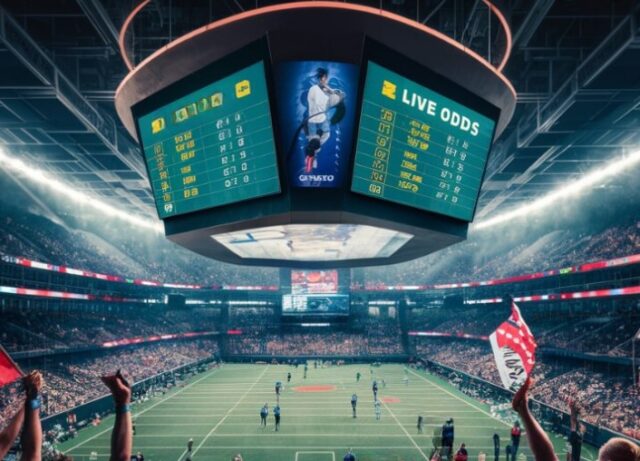
Sports betting is on the rise. It has always been around, to be sure. But with increasing relaxation of regulation and technological advancements, there is now greater availability for sports betting options than before.
In the US alone, a handful of states at least have legalized sports betting. Today, some 33 stats of a total of 50 allow sports betting. Interestingly, some of them, like Tennessee, allow only online betting and this too happened only in 2019.
Moreover, the demographic indulging in gambling is changing. Across generations, there is a rising interest, including in sports betting.
Sports betting among millennials

Millennials have shown the strongest interest in betting on National Football League (NFL) games. For context, NFL is the most popular among sports bettors in the US of all sports. Some 81% of sports bettors bet on the NFL.
Even though it offers fewer games as compared to basketball and baseball leagues, its draw is bigger. The popularity of football is likely due to cultural reasons. It is played everywhere from schools to neighborhoods, both as a sport and a recreational activity.
It is little wonder then that the average person is taking to it in a big way. According to a recent study done by Variety Magazine, 82% of millennial sports bettors waged bets on the NFL in the month of October 2022.
The other generations are not far behind though. Among Gen Z bettors, some 69% bet on the NFL, while the number was at an even bigger 84% among those of Gen X.
Among the preferred ways, millennials tend to download the MGM app for their Live Betting, though plenty of others are popular too.
An extra income
The driving force behind the rise of sports betting is undoubtedly technology and legislation. But sports betting is also drawing more fans to it, who get to make an extra buck for fun.
There could be other reasons for it as well. Like the need to make an extra income. Millennials in particular might be susceptible to this. Having been called the “most anxious generation in history”, the attitudes have a base in critical issues.
Between the ages of 26 and 40, they are in some of the most productive years of their life. But external conditions are not always supportive.
The global economy is in a difficult place right now. A growth slowdown and even recession are predicted in some of the biggest economies of the world in 2024. And this is at a time of inflation levels not seen in decades.
There is a cost of living at hand, while they struggle to hold on to their jobs while paying increasing bills every month. It does not help that getting credit is not a solution as interest rates rise too, making it harder to pay back later on.
The changing face of sports betting

It is no wonder then that 28% of Americans between the ages of 21-34 make sports bets once a month. The number rises to 31% when we consider the ages of 35-44.
This is very different from the trend of older generations. Of those aged between 50-64, only 10% bet once a month. The number is even smaller at 5% for those aged over 65.
Aggressive marketing by sports betting companies is likely to have driven this trend. It is estimated that in 2021, they spent USD 1.2 billion on advertisements.
At the same time, it is noteworthy that the size of bets is actually quite small. Among the young bettors, 29% bet less than USD 10 on a single game. Moreover, 47% actually bet less than USD 25.
Sports betting in Tennessee
But make no mistake, the face of sports betting isn’t just changing across the generations. It is changing across regions too. Tennessee is a prime example of this shift, gradually transforming from a state of spectators to active bettors. The regional variations in betting practices and trends are a testament to the ever-evolving nature of this industry.
Like in the state of Tennessee, where up until the 1990s, fans were looking at other states. Not any longer. The state now proudly hosts a vibrant sports betting scene, providing fans with exciting opportunities to engage in their favorite pastime. It’s a significant shift in paradigm, reflecting the increased acceptance and normalization of sports betting in society.
There are three major leagues associated with the state now. These are the NFL, the National Basketball Association (NBA), and National Hockey League (NHL). There is also interest in college sports. This diverse range of options has made Tennessee a hot spot for sports enthusiasts and bettors alike. Further, the inclusion of college sports underscores the comprehensive nature of the state’s betting landscape.
Betting small, but more
States like Tennessee are an example of the thriving sports betting market, ushered in with new era laws allowing online betting. Clearly, a sign of one of the changes in the market as fans get more driven into their states’ leagues. These digital platforms have expanded the reach and accessibility of sports betting, attracting a new wave of participants. In addition, the fervor around state leagues has fostered a sense of community among bettors.
Another sign of change is the rising millennial population making extra income from sports betting. This is not just for fun though, as they face challenging economic times when they have responsibilities. The potential for supplemental income provides an additional incentive for millennials to partake in sports betting. Yet, this is juxtaposed with the inherent risks involved, underscoring the complex motivations driving this trend.
Final Thoughts

All in all, sports betting or even gambling as such, is not what it used to be. And going by the looks of it, it will never be the same again either. These changes are a reflection of the evolving societal norms, technology advancements, and legislative shifts that continue to reshape the landscape. Indeed, the future of sports betting holds promising possibilities, marked by increased inclusivity and accessibility.









